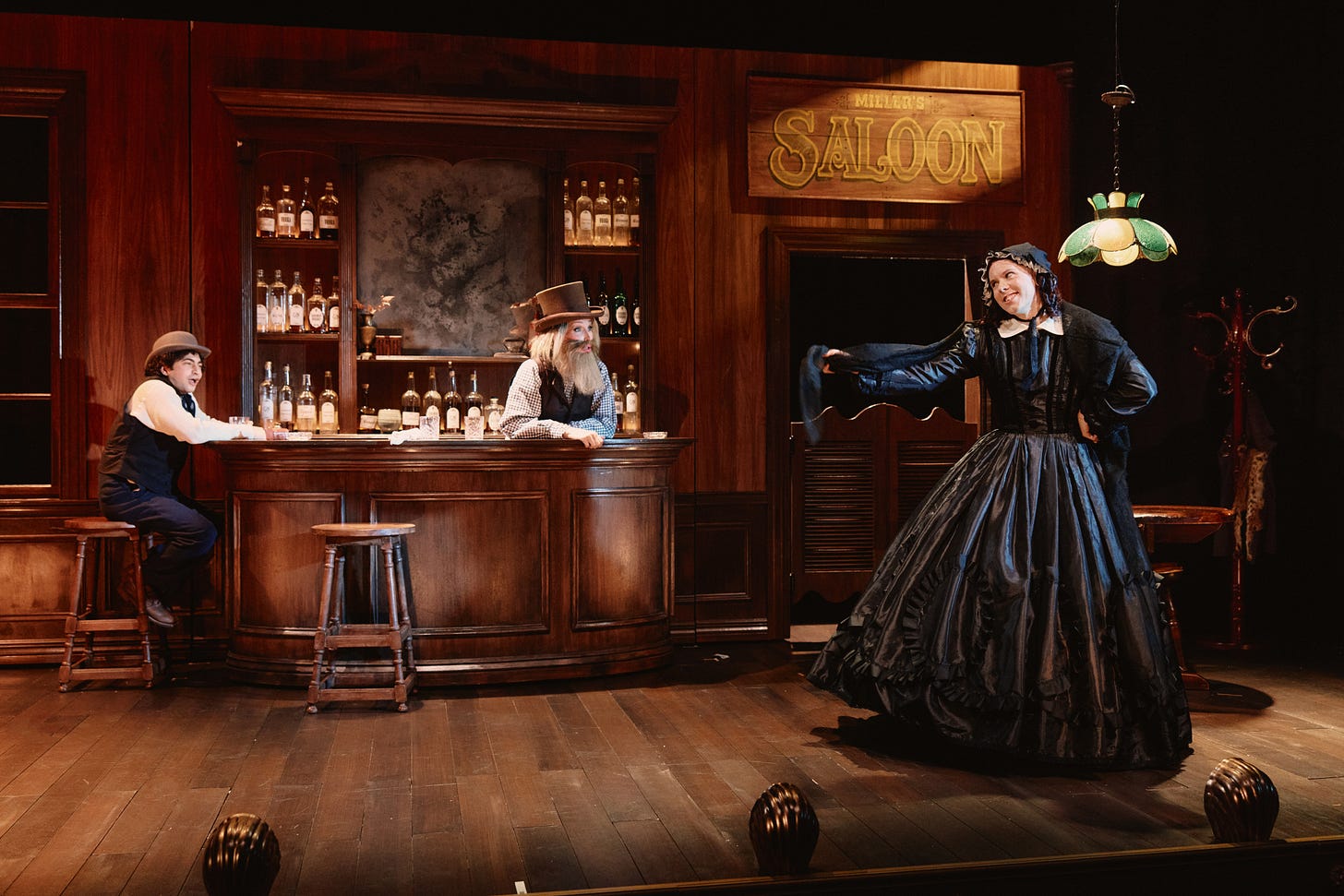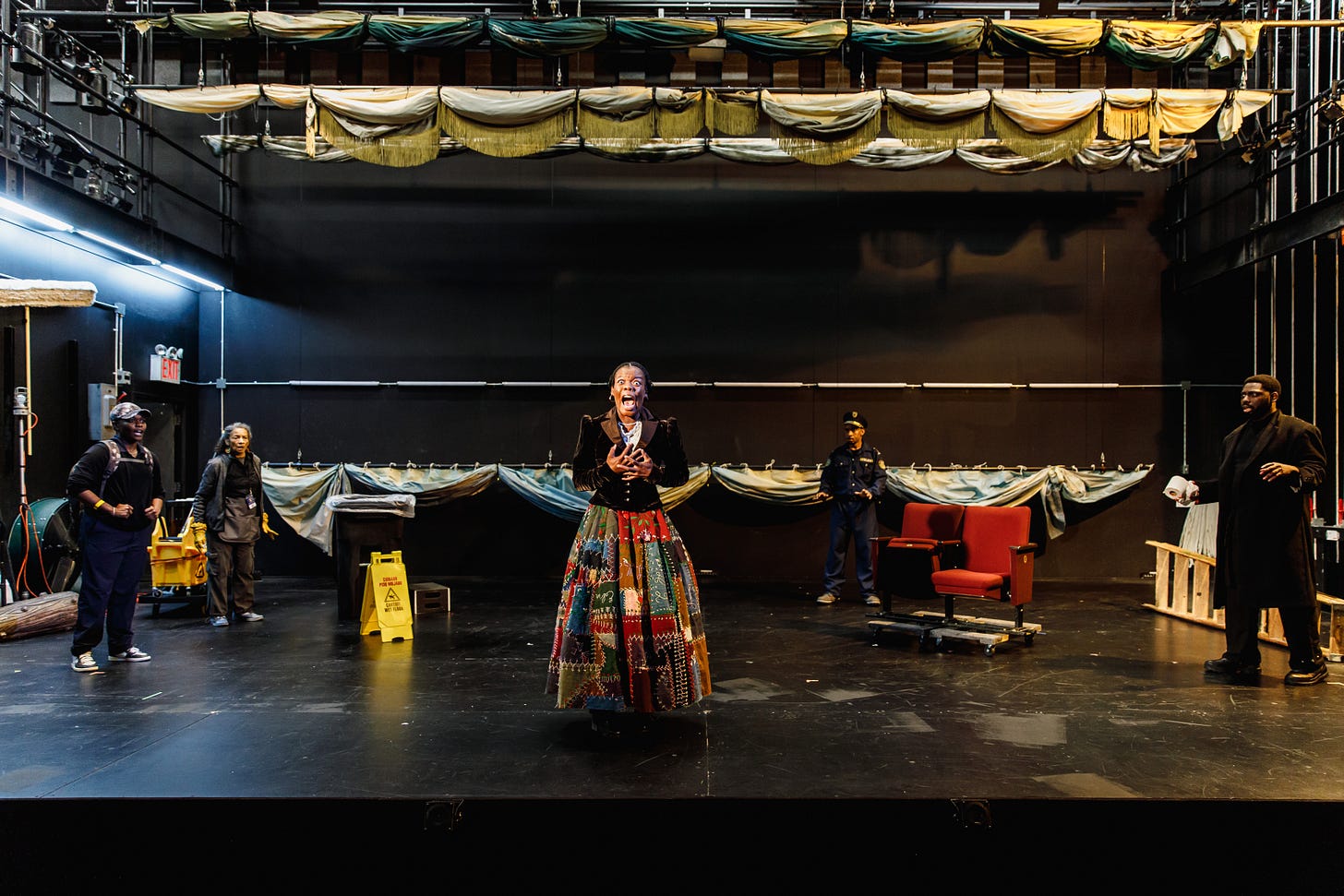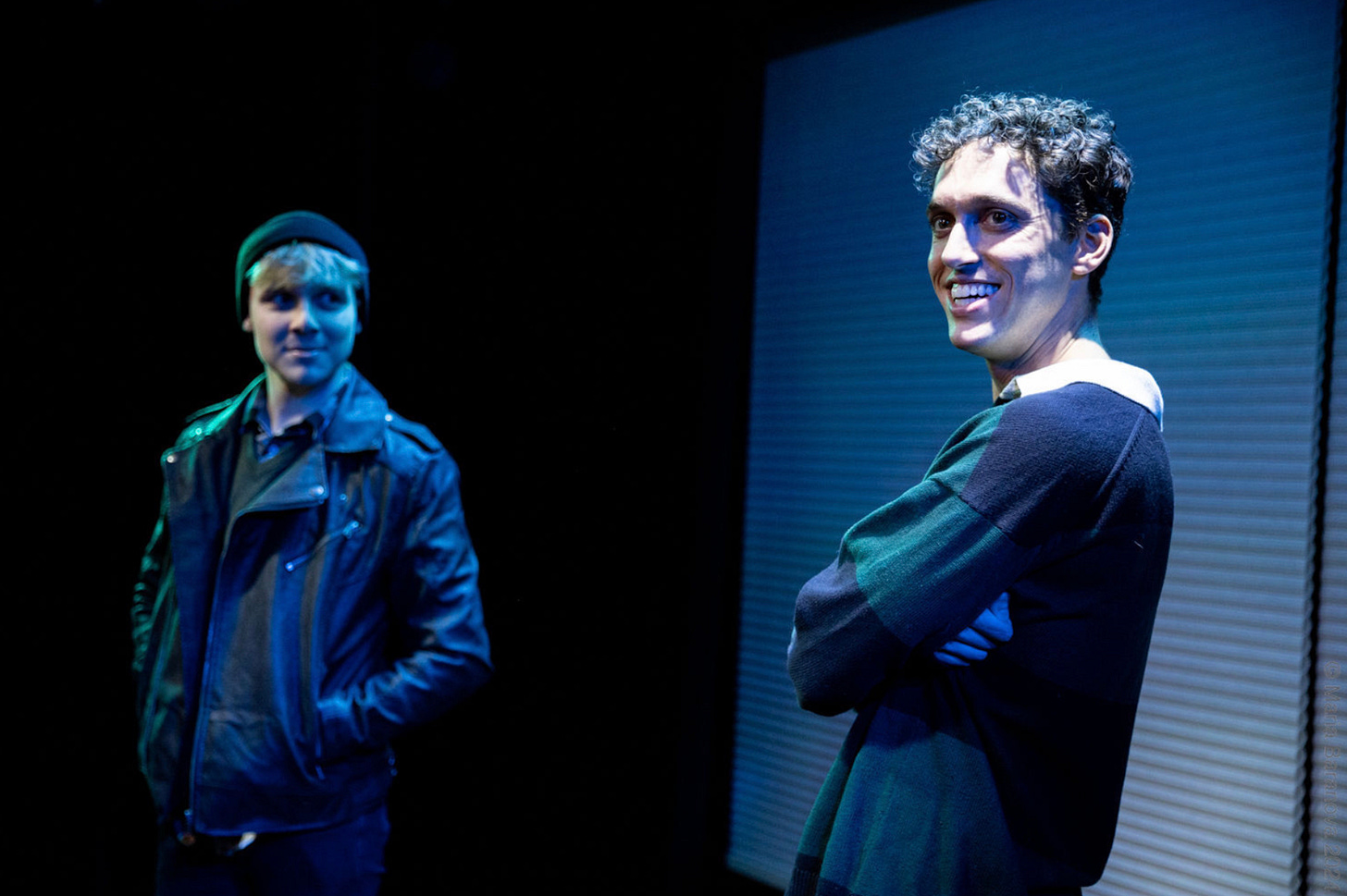10) Oh, Mary! (Lucille Lortel Theatre & Lyceum Theatre)
Cole Escola’s masterfully constructed camp farce earned profuse praise all year long—every bit of it deserved. Escola’s script is airtight, delivering constant laughs amid delightfully ahistorical twists and turns. Sam Pinkleton migrated his (deliberately) shabby production uptown to the Lyceum with impressive ease, and Oh, Mary! has lost none of its chaotic charm on Broadway. The sheer bliss of dumb, dumb comedy, made by very smart people.
9) Illinoise (Park Avenue Armory & St. James Theatre)

In spring and summer, Illinoise was a comfort. Justin Peck and Jackie Sibblies Drury’s campfire story-time spin on Sufjan Stevens’ concept album hit differently in each of its two homes—first as a majestic paean to empathy in the grand Drill Hall of Park Avenue Armory, then as a gentle, intimate tale of lost souls at the St. James Theater on Broadway. Wherever it played, Illinoise was a warm embrace, rigorously crafted and movingly brought to life by an open-hearted ensemble.
8) Six Characters (Lincoln Center Theater)
Flawed and messy, Phillip Howze’s fierce critique of the white supremacist power structures and narrative constructs on which the American theater is built amounted to a hugely satisfying “Fuck You” to the very institution staging it, Lincoln Center Theater. Why not? Howze, a compassionate provocateur, knew he’d probably never trick his way into this building again. So he took the opportunity to wreak some havoc and tear at the walls, perfectly aided by Dustin Wills’ rowdy direction. Not everything in this chaotic piece, which also sought to analyze the lure of fascism, totally worked. But what ambitious, trenchant and incisive fun.
7) Hothouse (Malaprop & Irish Arts Center)
Jumping smoothly between a struggling Irish family in 1969 and an Arctic cruise to bid farewell to the ice caps 100 years in our future, Carys Coburn’s bizarre new work tackled the impossible beast of climate change with wicked wit. Particular highlights included our depressed ship’s captain (and narrator) introducing each shift in time by announcing which bird went extinct that year, then shooting it in front of us; and an oddly hopeful post-apocalyptic coda, suggesting the birth of a better society on the other end of our coming destruction. We probably can’t save ourselves—but there’s much beauty in our past, and more beauty still to come.
6) Cats: “The Jellicle Ball” (Perelman Performing Arts Center)
How is it possible? Cats: "The Jellicle Ball” worked because its Ballroom setting lent weight and specificity to the bizarre musical’s typically abstract narrative world. It worked because Andrew Lloyd Webber’s earworms translated oh so easily to ballroom categories. And most of all, it worked because it was a hell of a lot of fun. “Jellicle Ball” also functioned as a moving tribute to the queens of ball culture, both past and present. Not to mention a thrilling imagining of the queer wonderland (or “Heaviside Layer”) we could, should, and in the space briefly did inhabit together as one single fabulous species.
5) you don’t have to do anything
Ryan Drake’s frighteningly honest new play bluntly voiced certain dark, horny, fucked-up truths about the queer experience that I never imagined I’d hear spoken aloud in a theater. Closeted teenager Teddy (Yaron Lotan, heartbreaking) forms an unsettling bond with the slightly older Clark (Will Dagger, scary yet bewitching) that leads to an assault. Neither kid, each adrift in a sea of self-denial, fully understands what happened, and Ryan Dobrin’s haunting production follows Teddy on the years-long journey of unraveling a single evening. A universal truth lives in Drake’s very specific story: the wounds of stunted development trail queer people long into adulthood, tragically delaying a full understanding of our complete, fully-formed identities.
4) Three Scenes in the Life of a Trotskyist (The Tank)
Andy Boyd’s timely work traced 40 years in the life of intellectual powerhouse Lev Trachtenberg, a Christopher Hitchens-esque figure inhabited with ferocious intensity by Jeff Gonzalez. Lev starts out as a Trotsykist in 1939 New York City, preaching permanent revolution against the higher classes. But as Lev rises within capitalist society, first as a professor at Columbia and eventually as the leader of a right-wing think tank, he becomes unrecognizable to former comrades—though Lev insists his values never changed. Jake Beckhard’s taut production kept up the pace while giving Boyd’s abundant ideas lots of room to breathe. Boyd’s brand of intellectually curious, unabashedly political work is growing all too rare in today’s American theater.
3) The Seven Year Disappear (The New Group)
Jordan Seavey’s ambitious tale, which chronicled the seven-year disappearance of performance artist Miriam (Cynthia Nixon, scorching) out of linear time, was misunderstood as primarily a satire of the art world. Admittedly, New Group artistic director Scott Elliott’s production didn’t exactly help the cause, leaning too heavily into a metatheatrical, multimedia experience. For me, Seavey’s play was most potent as a study of generational divides and a critique of the liberal “disappear” post-2008, as Miriam gets lost down a cul-de-sac of self-righteousness while leaving the real work to her son Naphtali (Taylor Trensch, relatably anguished), who grows aimless as progress stalls and a sense of hopelessness takes over.
2) Dead Outlaw (Audible Theater)
The most fun you could have in a theater this year. Dead Outlaw thankfully moves to Broadway next spring, a deserved future life for this exhilaratingly macabre musical from crackerjack team David Yazbek, Erik Della Penna and Itamar Moses. David Cromer’s inventive production traverses America’s darkest corner with a light touch, anchored by a tour-de-force work from Andrew Durand and sharp-tongued narration from the essential Jeb Brown. An especial delight was Thom Sesma’s delightful work as a crooning coroner, who very nearly steals the show. What a treat.
1) Mary Jane (Manhattan Theatre Club)
Eligibility questions be damned—I missed Amy Herzog’s gentle masterpiece when it played off-Broadway in 2017, so it demands inclusion here. A devastating portrait of loss, love and human resilience, Herzog’s play is among the finest of this century. Anne Kauffman’s careful staging finds warmth and light in a tragic tale. It’s true that certain scenes, like a musical serenade for Mary’s son at his hospital bed, are so viscerally upsetting that you almost long for them to end. And yet you don’t—the writing is so humane, so rich with love, you could live in this brutal yet tender world forever.












